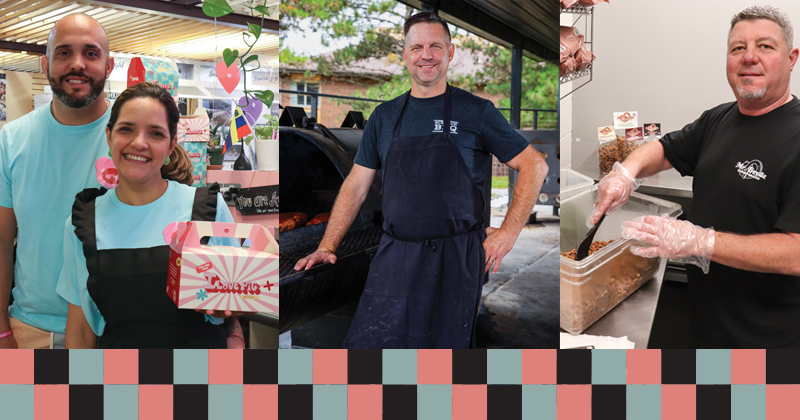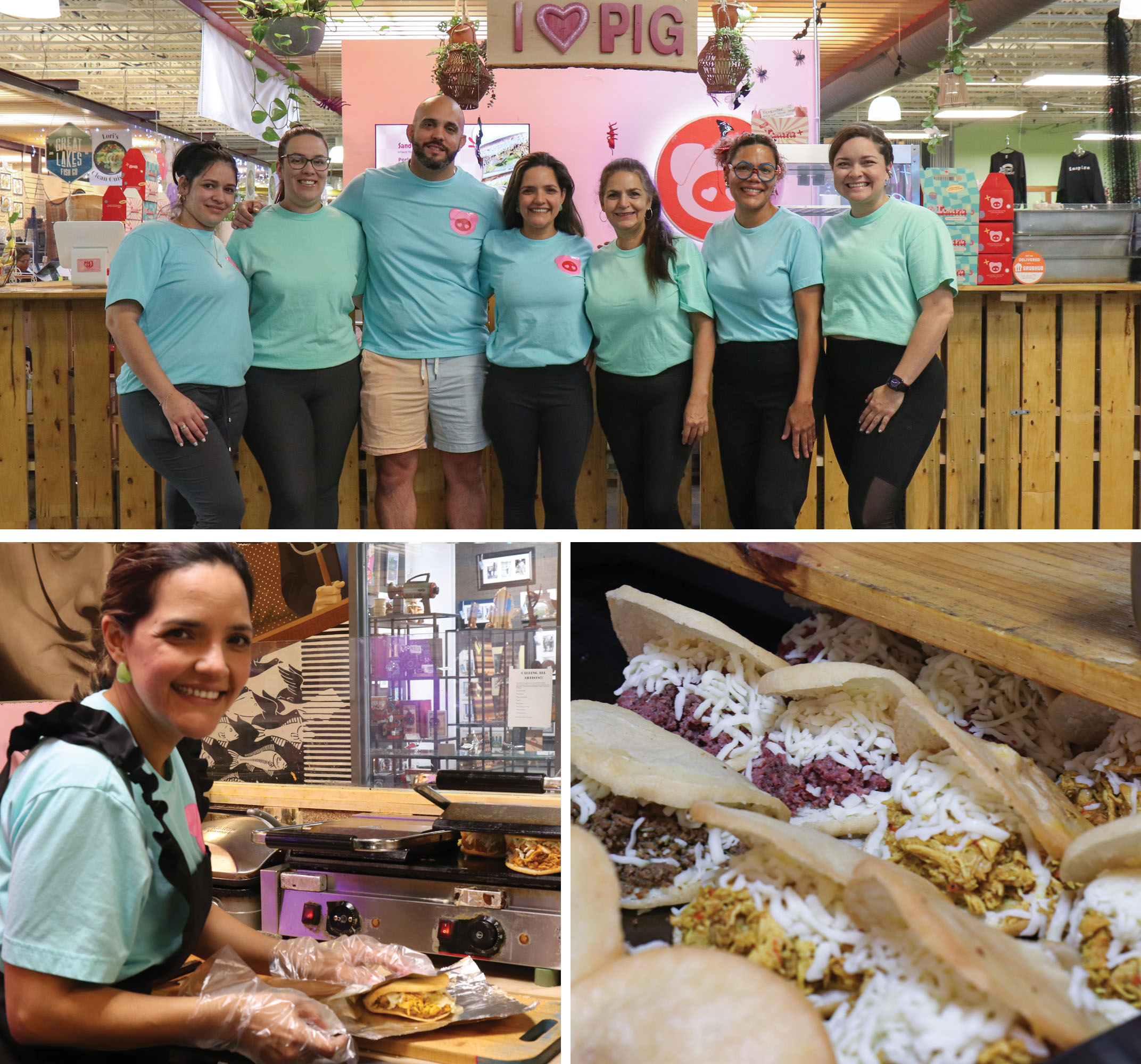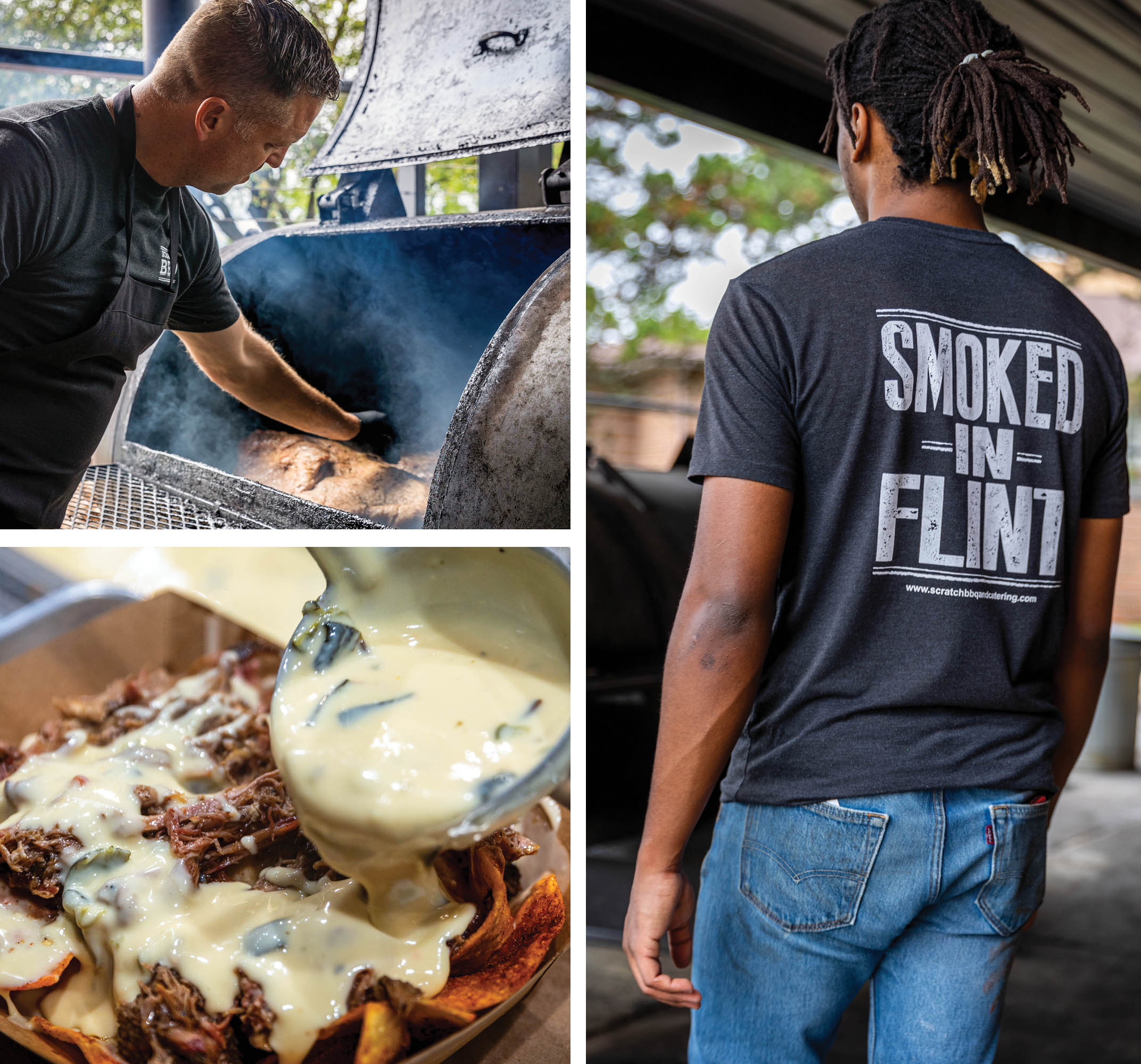
Aliz Mendoza had the dream and determination; she just needed the know-how to bring the idea to life.
That’s where Flint Food Works stepped in.
“Flint Food Works took me by the hand and walked me through building my food business from the ground up,” said Mendoza, owner of the I Love Pig eatery at the Flint Farmers’ Market. “They guided me step by step through the process of obtaining permits and licenses, taught me how to operate everything, and introduced me to the community.
“Now, we’re a great success and we are deeply grateful to them.”
Flint Food Works is a shared-use kitchen and food business incubator located inside the Flint Farmers’ Market. Since opening a decade ago, Flint Food Works has provided hundreds of entrepreneurs with the facilities and training needed to establish commercial food products and perfect recipes, and develop business models to help them grow.
Today there are 23 licensed businesses renting space – the highest membership they’ve seen since its 2014 opening, said Sean Gartland, Flint Food Works’ culinary director.
The whole concept of a business incubator or shared kitchen is that we want people to grow to the point where they can invest in their own space, move out, and become success stories.”
Sean Gartland
Some members use the space to create packaged foods sold in groceries, while others make ready-to-eat food for catering or food trucks. Vendors like Mendoza use it to cook food sold in the farmers’ market.
“We have a pretty unique facility for our area because it’s a fully equipped, modern, safe, and a really low-cost place to produce food,” Gartland said. “Our mission is to help entrepreneurs get off the ground floor and literally take a product from the field to the market.”
Members pay $18 per hour to use the kitchens, which are open 24/7 throughout the year.
But selling food to the public is far more complicated than just whipping up tasty treats. It requires knowledge of local food laws and regulations, adherence to processing and preparation guidelines, as well as business and financial planning.
“Starting a food-based business is not the same as starting a T-shirt business,” said Karianne Martus, manager of the Flint Farmers’ Market. “There are a lot of hoops to jump through, a lot of things to really keep track of while you get up and running.”
Flint Food Works is there to help.
Mendoza and her family moved to Flint in 2019 after relocating the family’s vehicle transportation business here from Miami.

Always an entrepreneur, Mendoza owned a restaurant in Venezuela before emigrating to the United States and longed to start something similar in Genesee County featuring traditional South American cuisine.
After discovering the Flint Farmers’ Market, she and her husband, Gustavo Martin, met with Gartland to learn how to make her dream become a reality.
After attending several meetings; completing a business plan, member application, intake documents, and kitchen orientation; and receiving a food service license, I Love Pig opened in the market’s outdoor pavilion in the spring of 2022. They moved inside the market the following year.”
The eatery’s most popular dishes are arepas, a flatbread dough made from cornmeal and stuffed with seasoned meats, vegetables, and cheese popular in South America. I Love Pig’s arepas are served with Mom’s Sauce, a creamy garlic and cilantro mayonnaise handmade by Carmen Martin, Mendoza’s mother-in-law, who also runs kitchen operations.
The Flint Farmers’ Market has proven itself a popular downtown destination for residents and visitors alike.
It features 30 seasonal, outdoor vendors and 45 year-round, indoor vendors offering produce, a meat market, poultry, breads and baked goods, cheese, a wine shop, a café, Middle Eastern and Mexican groceries, gifts, and more.
While Flint Food Works calls the market home and they work together on many projects, the two remain separate entities.
“I wouldn’t want to give the impression that if you use Flint Food Works, then you’re going to get a spot in the market. Right now, we don’t have space for new vendors in the market,” Martus said. “Another big misconception is that you must have a space in the market to use the kitchens. That’s not true.”
One of the kitchen’s renters, Mr. Brettz Gourmet Snacks, uses the facility to prepare and package seasoned pretzels which are then sold online and in grocery stores, including six Meijer locations.

Brett Garver and his fiancée, Athena Holmquist, started the company in 2020 after Garver created a homemade pretzel seasoning his friends couldn’t stop asking for. The Grand Blanc couple initially utilized two other shared-use kitchens before finding Flint Food Works this spring.
“Commercial kitchen space like that is crucial to a business like mine,” said Garver, who also works full-time for an energy rebate company. “It isn’t a business where I could just spend, you know, $500,000 and build my own kitchen. We don’t need that.
“So, it’s really crucial to have that infrastructure already in place at Flint Food Works and then we just schedule the time in the kitchen three or four times a month as needed.”
And business is booming: By mid-October, Mr. Brettz Gourmet Snacks had sold 8,700 bags of six- and 15-ounce pretzels.
Gartland said the biggest reward for him is when a Flint Food Works member does so well it no longer needs a place in their kitchens.
“The whole concept of a business incubator or shared kitchen is that we want people to grow to the point where they can invest in their own space, move out, and become success stories,” Gartland said.
After years of hard work, that’s exactly what happened for Flushing teacher Mike Lintz.
Lintz started Scratch BBQ & Catering in 2015, relying on 24-hour access to the Flint Food Works kitchens to prepare everything from brisket and ribs to cornbread and green beans for his catering customers.

“That allowed us to really get started without fronting an ungodly amount of money to invest in our own commercial kitchen,” Lintz said. “We had access to the ovens, to cold and dry storage areas, and to all the equipment and utensils we needed.
“It made it possible to take a chance on a new business without totally getting burned.” With each passing year, Scratch BBQ grew more popular. Three years ago, Lintz took the leap and purchased the former Fuddruckers at 2373 Austin Parkway in Flint Township. After extensive renovations, he opened his doors to the in-person restaurant last December.
“We’re thrilled with the restaurant – and so are our customers,” Lintz said. “But it never would have been possible without the support we received all those years from Sean, Karianne, and all the other vendors who used the kitchen with us.
“They encouraged us to continue doing what we were doing and to think bigger.”
Mendoza is also thinking bigger. In addition to the market eatery, I Love Pig just finished its first summer attending fairs and festivals across Michigan in a new food truck. The business has grown from just three to 10 workers, she said.
“I believe anything is possible if you seek help and put your ideas to the service of the community,” Mendoza said. “I like to tell women, especially Latinas: ‘In this city, you can truly flourish and prosper.’”
